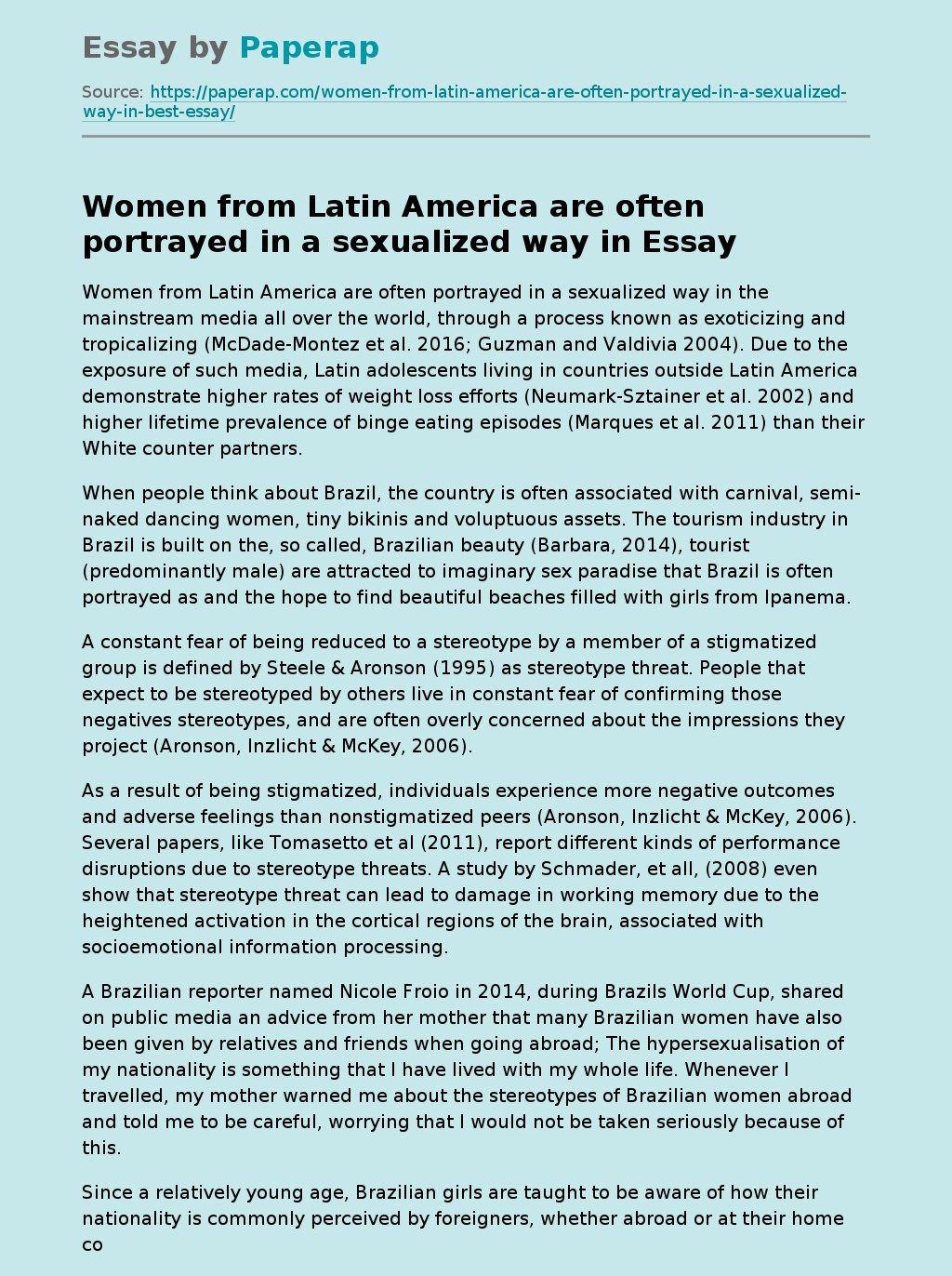sexualized Women from Latin America
The following example essay on “Sexualized Women From Latin America” talks about how eroticization of the Brazilian female body, often portrayed by, both national and international media, lead to reinforce the stereotype about Brazilians sexual behavior, contribute very negatively to the mental health and well-being of Brazilian women living abroad.
Women from Latin America are often portrayed in a sexualized way in the mainstream media all over the world, through a process known as exoticizing and tropicalizing (McDade-Montez et al. 2016; Guzman and Valdivia 2004).
Due to the exposure of such media, Latin adolescents living in countries outside Latin America demonstrate higher rates of weight loss efforts (Neumark-Sztainer et al. 2002) and higher lifetime prevalence of binge eating episodes (Marques et al. 2011) than their White counter partners.
When people think about Brazil, the country is often associated with carnival, semi-naked dancing women, tiny bikinis and voluptuous assets. The tourism industry in Brazil is built on the, so called, Brazilian beauty (Barbara, 2014), tourist (predominantly male) are attracted to imaginary sex paradise that Brazil is often portrayed as and the hope to find beautiful beaches filled with girls from Ipanema.
A constant fear of being reduced to a stereotype by a member of a stigmatized group is defined by Steele & Aronson (1995) as stereotype threat. People that expect to be stereotyped by others live in constant fear of confirming those negatives stereotypes, and are often overly concerned about the impressions they project (Aronson, Inzlicht & McKey, 2006).
As a result of being stigmatized, individuals experience more negative outcomes and adverse feelings than nonstigmatized peers (Aronson, Inzlicht & McKey, 2006). Several papers, like Tomasetto et al (2011), report different kinds of performance disruptions due to stereotype threats. A study by Schmader, et all, (2008) even show that stereotype threat can lead to damage in working memory due to the heightened activation in the cortical regions of the brain, associated with socioemotional information processing.
A Brazilian reporter named Nicole Froio in 2014, during Brazils World Cup, shared on public media an advice from her mother that many Brazilian women have also been given by relatives and friends when going abroad; The hypersexualisation of my nationality is something that I have lived with my whole life. Whenever I travelled, my mother warned me about the stereotypes of Brazilian women abroad and told me to be careful, worrying that I would not be taken seriously because of this.
Since a relatively young age, Brazilian girls are taught to be aware of how their nationality is commonly perceived by foreigners, whether abroad or at their home country. When traveling abroad, Brazilian women often report being extremely concern about the types of clothes they wear and how to engage in conversations with male foreigners. As a Brazilian woman myself I could identify multiple behaviors and emotions related to stereotype threat that I was experiencing (and still do).
During my life, I had the opportunity to live, even though briefly, in three different countries in Europe, firstly in Spain, second in Germany and now Portugal. During those experiences I struggled with an exposure to discriminatory behaviors and constantly being victim of conformation bias, for example, when foreign men try to justified my choice of clothes based on my nationality whenever I decide to wear a cleavage.
According to The Stereotype Content Model (Fiske et al., 2012), due to evolutionary predisposition, people tend to evaluate others according to two dimensions; warmth and competence. The assessment of anothers intention to either warm of help, correspond to the perception of warmth, and the capability to do so, correspond to the perception of competence (Fiske et al., 2012).
Considering the Stereotype Content Model, Brazilians in general are perceived as being very warm but not competent. During my experiences abroad I have noticed myself gradually more stress and concern about confirming negative stereotypes, not only about Brazilians promiscuity, but also incompetence. Many foreign men often share their notion of beautiful Brazilian women being solely suitable to be a trophy wife.
It was not until I lived in Portugal that I noticed the stereotype threat outcomes experienced by me became more salient and even increased. In Portugal the usual coping mechanism of concealing my nationality as part of my identity became an issue, since the sole act of speaking reveals my country of birth.
During my stay, I have encountered several Brazilian women that changed their strategically forged Portuguese accents to their original, and more comfortable, Brazilian one when realized they were speaking with a fellow native of their home country.
Attempts to hide their accent, conceal their identity, constant evaluation of clothing, among other, are coping strategies Brazilian women often report while living abroad, fearful of confirming negative hypersexualized stereotypes about Brazilians and being constantly harassed.
sexualized Women from Latin America. (2019, Nov 26). Retrieved from https://paperap.com/women-from-latin-america-are-often-portrayed-in-a-sexualized-way-in-best-essay/

